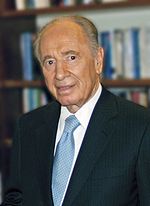Kadima
It was established on 24 November 2005 by moderates from Likud largely following the implementation of Ariel Sharon's unilateral disengagement plan in August 2005,[4] and was soon joined by like-minded Labor politicians.
However, the party was initially named "National Responsibility" (Hebrew: אחריות לאומית, Ahrayaut Leumit),[11] which was proposed by Justice Minister Tzipi Livni and endorsed by Reuven Adler, Sharon's confidante and strategy adviser.
It had been used by early Zionist leader Nathan Birnbaum, and was the motto of the Jewish Legion of World War I formed by Ze'ev Jabotinsky and Joseph Trumpeldor.
The name was criticised by Shinui leader Yosef Lapid, who compared it to Benito Mussolini's newspaper Avanti (Italian for "Forward").
Deputy ministers Ruhama Avraham, Majalli Wahabi, Eli Aflalo, Marina Solodkin, Ze'ev Boim and Yaakov Edri also joined, along with Likud MKs Roni Bar-On and Omri Sharon.
One poll suggested the party would win 42 seats in the March 2006 elections with Peres as leader compared to 40 if led by Ehud Olmert.
However, on 4 January 2006, 22:50 Israel Time (GMT +0200), Sharon suffered a massive hemorrhagic stroke, and was evacuated to Hadassah Ein Kerem hospital in Jerusalem to undergo brain surgery.
Following her victory, Livni failed to form a coalition government, as she refused to agree to Shas' demands, resulting in early elections in February 2009.
However, Likud's Netanyahu was asked to form a government by President Peres following talks with delegations from all parties represented in the Knesset.
Early statements from the Sharon camp reported by the Israeli media claimed that they were setting up a truly "centrist" and "liberal" party.
Justice Minister Tzipi Livni reportedly told Israel Army Radio that Kadima intended to help foster the desire for a separate Palestinian state, a move applauded by leftist Yossi Beilin.
[citation needed] Sharon was one of the prime architects pushing for the construction of the Israeli West Bank barrier that has been criticized by left-wing and right-wing Israeli politicians, but was a cornerstone of Sharon's determination to establish Israel's final borders, which he saw himself as uniquely suited to do in the so-called "Final Status" negotiations.
In a 22 November 2005 press conference, Sharon also mentioned that he favored withdrawing from untenable Israeli settlements in the West Bank, although he declined to give an actual timeline or specifics for the proposed action.
Founder Ariel Sharon spent a career switching between the right of Israeli politics and the left—notably in the 1970s when he served as an aide to then Prime Minister Rabin.
The previous government of Ehud Olmert was considered left of center, collaborating with the Labor and two sector-socialist parties, Gil and Shas.
Following the 2009 elections, with its subsequent political negotiations for a centrist coalition with the Likud and the Labor, it is suggested that the ideological differences of the center-left and center-right in Israel are fairly minor, but the fact that this only lasted 60 days belies this.
[41] The Haaretz diplomatic correspondent Aluf Benn suggested in November 2009, that Kadima does not have any ideological differences with the Labor Party that would prevent a merger.

